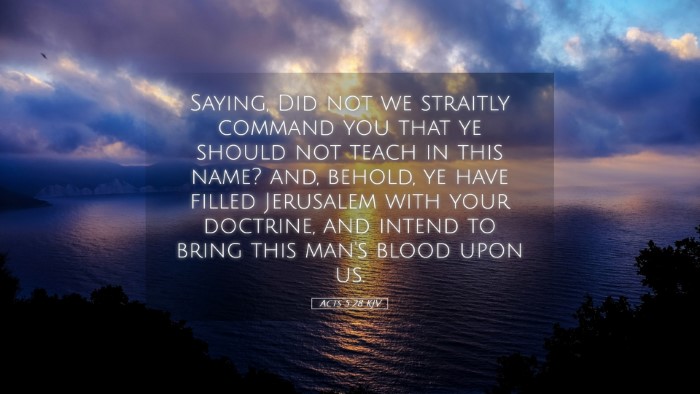Commentary on Acts 5:28
Verse: "Saying, Did not we straitly command you that ye should not teach in this name? and, behold, ye have filled Jerusalem with your doctrine, and intend to bring this man's blood upon us."
Introduction
Acts 5:28 presents a significant moment in the early Christian church's confrontation with the religious authorities of Jerusalem. This verse captures the complaint of the Sanhedrin against the apostles for their persistent preaching of the Gospel. The implications of this verse echo throughout theological studies and discussions on the relationship between the church and government, as well as the nature of apostolic witness.
Contextual Background
The Acts of the Apostles illustrates the explosive growth of the early church amid the challenges posed by Jewish leaders. In Acts 4, the apostles Peter and John were arrested and warned not to speak in the name of Jesus. They boldly defied these orders, stating they must obey God rather than men (Acts 5:29). This defiance sets the stage for the events of Acts 5:28.
Commentary Insights
Authority of the Religious Leaders
The Sanhedrin’s inquiry, "Did not we straitly command you...?" shows their assertion of authority. Matthew Henry notes that this command reflected the religious leaders' fear and desire to maintain control over the populace. Their authority was being undermined not only by the apostles’ teachings but also by the growing number of believers.
The Apostles' Defiance
Both Albert Barnes and Adam Clarke emphasize the courage and commitment of the apostles in preaching despite the dangers. They perceived their mission as divinely mandated, driven by the resurrection of Christ, which solidified their resolve to spread the message regardless of human opposition. The reaction from the Sanhedrin indicates a desperate attempt to suppress this burgeoning movement.
Accusation of Guilt
The phrase "intend to bring this man's blood upon us" is a poignant accusation from the Sanhedrin. Matthew Henry suggests that this reflects their awareness of their guilt in the crucifixion of Jesus, whom the apostles boldly identified as the Messiah. The Sanhedrin's fear of culpability highlights their inner turmoil and concern about public perception.
The Impact of Apostolic Teaching
The statement that the apostles "have filled Jerusalem with your doctrine" illustrates the pervasive influence of the Gospel. Albert Barnes reflects on the rapid spread of Christian teachings and its ability to resonate throughout Jerusalem. It signals the success of the apostles' mission, yet also invites scrutiny and hostility from those in power.
Theological Implications
Acts 5:28 invites deeper theological reflection regarding obedience to divine authority versus human authority. It prompts questions about the nature of witness and the cost associated with proclaiming the truth. The juxtaposition between the commands of the Sanhedrin and the mandates from God opens a discourse on civil disobedience in the name of faith.
Obedience to God vs. Men
Within this narrative, Adam Clarke posits that the apostles’ actions exemplify a higher loyalty to God that transcends earthly authority. This sentiment resonates with various biblical texts that prioritize divine engagement: “For we cannot but speak the things which we have seen and heard” (Acts 4:20).
Relevance for Today's Church
The verse and its context challenge modern believers to evaluate their own commitments and bravery in proclaiming the Gospel amidst societal or governmental pressures. Matthew Henry encourages contemporary application by reminding readers of the importance of perseverance in faith, while also advocating for wisdom in navigating complex spiritual and social landscapes.
The Role of the Holy Spirit
Throughout Acts, the empowering presence of the Holy Spirit acts as a catalyst for the apostles. The events surrounding Acts 5:28 highlight the necessity of divine strength in face of opposition. The apostles improved in their apprehension of Scripture and their mission’s urgency, a vital consideration for clergy and theologians studying ecclesiology and mission.
The Church's Witness
The response of the Church, as modeled by the apostles, serves as a template for how believers today are to bear witness to Christ amid hostility. Albert Barnes details that this fierce opposition served to embolden the apostles. A robust understanding of Acts 5:28 informs pastors on the importance of fostering congregations willing to stand firm in the faith.
Conclusion
Acts 5:28 encapsulates a critical juncture in the early church's bold witness against the authority patterns of its time. It calls into question the natural human inclination to conform under pressure. Insights from commentators like Matthew Henry, Albert Barnes, and Adam Clarke enrich our understanding of the dynamics at play and enhance our approach to teaching and preaching the enduring truths of Scripture in contemporary society.


